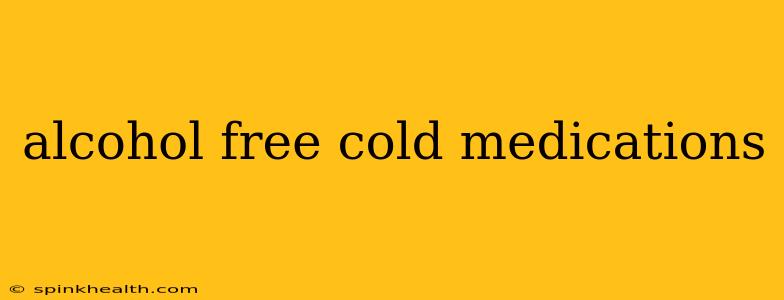The sniffles hit, your throat feels scratchy, and the dreaded cold has arrived. Reaching for relief is natural, but navigating the world of cold medications can be tricky, especially if you're looking for alcohol-free options. This isn't just about avoiding a buzz; alcohol in some medications can interact poorly with other drugs or exacerbate certain health conditions. This guide will help you understand the landscape of alcohol-free cold remedies and make informed choices for your health.
Our journey begins with a common concern:
Are all cold medicines alcohol-free?
No, definitely not. Many older formulations of cough syrups and other cold remedies contained alcohol as a solvent or preservative. However, a significant shift towards alcohol-free alternatives has occurred in recent years, driven by consumer demand and a greater awareness of the potential downsides of alcohol in medications. You'll find plenty of alcohol-free options on pharmacy shelves, but always check the label carefully. The ingredient list will clearly state if alcohol is present, often listed as "alcohol" or "ethanol."
Let's delve into some specific questions that often arise:
What are the common active ingredients in alcohol-free cold medications?
Many alcohol-free cold medications rely on a combination of active ingredients to target different cold symptoms. These commonly include:
- Decongestants (like phenylephrine or pseudoephedrine): These help relieve stuffiness in your nose by shrinking swollen blood vessels. Important Note: Pseudoephedrine is a controlled substance in some regions due to its use in methamphetamine production, so purchasing restrictions may apply.
- Expectorants (like guaifenesin): These help thin mucus, making it easier to cough up.
- Antitussives (like dextromethorphan): These suppress coughs.
- Pain relievers/fever reducers (like acetaminophen or ibuprofen): These help reduce aches, pains, and fever.
The specific combination of active ingredients will vary depending on the brand and the particular formulation (e.g., for cough, congestion, or general cold symptoms).
What are some examples of alcohol-free cold medications?
The market is brimming with choices! You'll find numerous brands offering alcohol-free versions of their cold and flu remedies. Looking for specific product names is best done by checking your local pharmacy's shelves or online retailer listings. Remember, always read the label carefully to ensure the product is alcohol-free and suits your specific needs.
Are there any alcohol-free cold remedies for children?
Yes, absolutely! Many brands offer specially formulated alcohol-free cold medications for children, often with lower doses of active ingredients tailored to their age and weight. However, it's crucial to follow the dosage instructions precisely and consult a pediatrician before giving any medication to a child.
Can I mix alcohol-free cold medications with other medications?
While many alcohol-free cold medications are considered safe, it's always wise to check with your doctor or pharmacist before combining them with other medications, particularly prescription drugs. Some ingredients can interact negatively, leading to unforeseen side effects.
Where can I find alcohol-free cold medications?
Alcohol-free cold medications are widely available in most pharmacies, both online and in brick-and-mortar stores. You can also find them at many supermarkets and convenience stores.
In Conclusion:
Choosing alcohol-free cold medication is a simple but important step towards responsible self-care. By paying close attention to labels, understanding active ingredients, and consulting healthcare professionals when needed, you can effectively manage cold symptoms without the potential complications associated with alcohol in medication. Remember, always prioritize reading labels and consulting a healthcare professional if you have any concerns or underlying health conditions.

